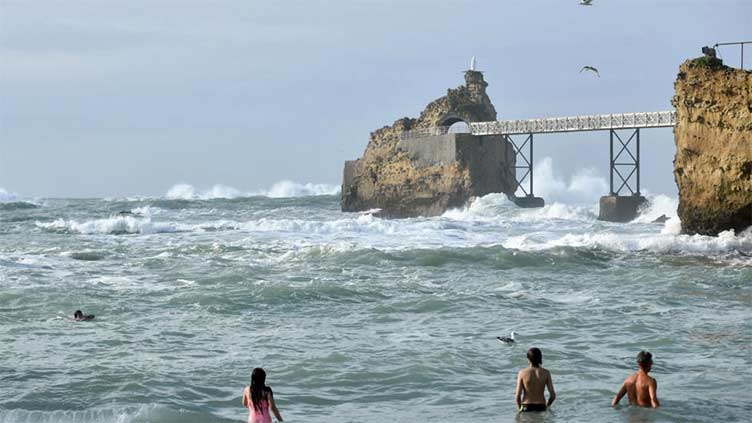Storm Ciaran triggers weather alert in northwestern Europe

World
Meteorologists warned that the Ile-de-France region, which includes Paris, could have violent gusts
PARIS (AFP) – Much of northwestern Europe went on high alert Wednesday as a storm dubbed Ciaran threatened to bring gale-force winds and extreme rainfall to the region.
Three French departments – Finistere, Cotes-d'Armor and Manche – will be placed on red storm alert, the highest level, at midnight (2300 GMT), national weather agency Meteo-France said.
Meteorologists warned that the Ile-de-France region, which includes the capital Paris, could have violent wind gusts.
The SNCF rail network said it would halt service on several of its suburban commuter lines around the capital, including the popular RER A train that serves western suburbs.
Two French regions will also be placed on maximum flood alert, it added.
Vast stretches along the French coast, from the Gironde region to the northern Hauts de France, will be on the lower category orange alert.
In Pas-de-Calais, authorities said they would open two gymnasiums and several shelters for migrants who converge on the region, hoping to make it to Britain by boat.
In Britain, the meteorological office said there would be bursts of heavy rain, a risk of flooding in some areas and gusts of 60-70 miles per hour along England's south coast.
In France, the storm was even expected to unleash winds of up to 170 kilometres (106 miles) per hour, notably on the coastlines of Brittany and Normandy in the northwest, Meteo-France forecaster Francois Gourand warned on Tuesday.
Rainfall could reach 50 millimetres within just six hours in those areas, the weather agency said.
Ciaran is expected to hit Brittany before midnight Wednesday, with winds of up to 150 kmph on the coast, and 130 kmph inland with a second, more violent, storm phase following some hours later.
Rail services cancelled
Some 3,200 firefighters will be deployed in the most exposed areas, the French interior ministry said.
The authorities, warning of falling trees and blocked roads, have urged people to remain indoors and stay away from the coast.
The government also banned all truck traffic in Brittany for Thursday.
National rail operator SNCF has stopped regional trains in the most affected areas, and cancelled a number of high-speed TGV rail services.
Eurostar, expecting disruptions and slowdowns, told AFP it was recommending that passengers delay any trips planned for Thursday.
The Brittany airports of Brest and Quimper were ordered closed, and most ferry traffic to Breton islands is to be stopped.
Coastal flooding is likely from early Thursday, Olivier Caumont, also at Meteo-France, told reporters, with waves possibly rising up to 10 metres (33 feet).
Maritime authorities issued a strong warning against taking boats out to sea, or even approaching the coast "be it by car or on foot".
'Lie low, fingers crossed'
They also said a powerful tugboat would be deployed to help any vessels in distress.
"All we can do is to lie low and keep our fingers crossed," said Olivier Laban, president of the shellfish farming committee in the Arcachon basin in France's southwest.

In Britain Kate Marks, flood duty manager at the Environment Agency, said "significant flooding" was possible, warning people to stay away from swollen rivers and motorists not to drive through flood water.
Storm Ciaran comes less than two weeks after Storm Babet claimed five lives in the UK in heavy flooding and high winds.
"Some parts of south Wales and southwest England may see 80 mm (more than three inches) of rain," said Met Office deputy chief meteorologist Dan Suri.
Flooding due to heavy rain has already seen some 12,000 sandbags deployed in the east of Northern Ireland.
The Channel Islands, off the coast of northern France, have also been warned to prepare for flooding.
As far as Spain
In Belgium, the weather office issued an orange alert for the Flemish coast, a yellow alert for the rest of the country, and urged "great caution".
The cities of Brussels, Antwerp and Liege announced that parks would be closed.
The Flemish provinces of West Flanders and East Flanders both said they would close access to outdoor sports facilities, and ban people from entering forests or natural reserves.
In neighbouring Netherlands, the weather service issued a code yellow alert for Thursday, while motorists were advised to work from home to avoid traffic jams.
Several schools said they would be closed or partially closed Thursday.
Ciaran's impact could be felt as far south as Spain, where wind speeds of up to 90 kph were expected for Thursday.
Authorities asked people to take down tarpaulins, avoid walking under trees and removing flower pots from balconies.
While storms are a naturally recurring phenomenon, they can be made worse by climate change, according to scientists.
Flooding is likely to be exacerbated by rising ocean levels as a result of melting glaciers.


